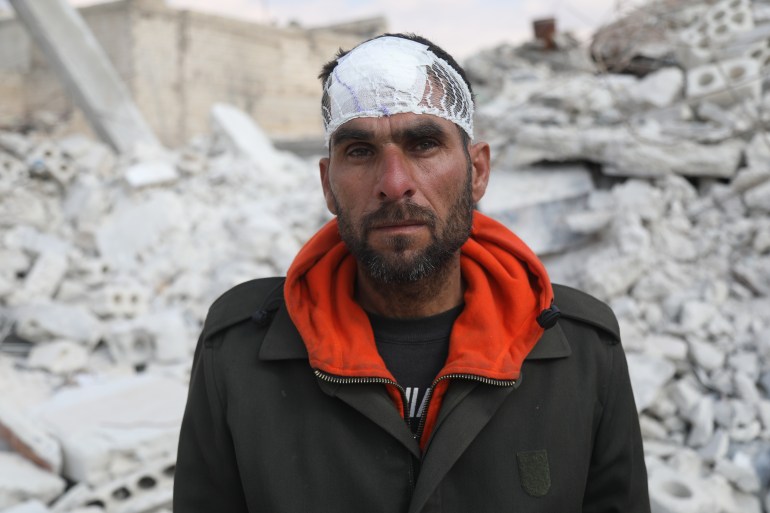‘Buried alive’: Syrians recount losing family in the earthquakes
According to the Syria Civil Defence, 2,274 people died in Syria’s rebel-held northwest region, with more than 12,400 others wounded.
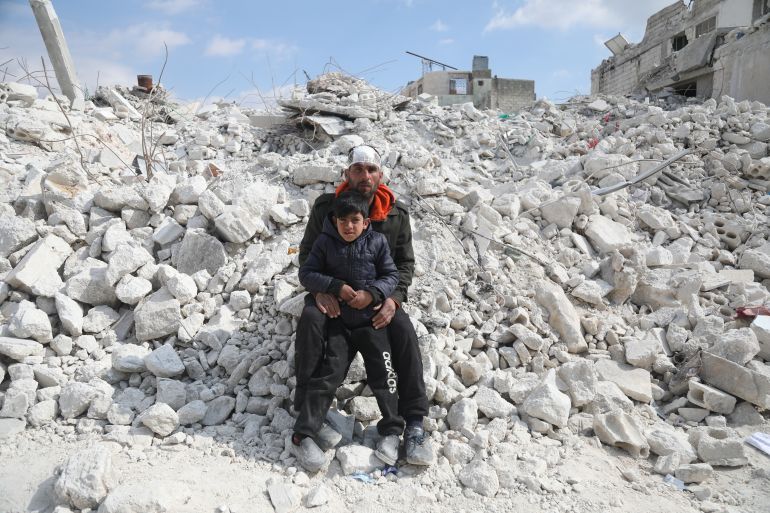
Atarib, Syria – When the first earthquake struck on February 6, heavily pregnant Sakhaa al-Mousa was jolted awake in her apartment. Before the 24-year-old had time to fathom what was going on, the three-storey building she and her family were in caved, trapping them underneath.
“I started screaming, hoping that someone outside could hear me,” she told Al Jazeera. “I could hear the rescuers but they couldn’t hear me. So I grabbed a rock and started banging it on one of the walls above me.”
Keep reading
list of 4 itemsEarthquake death toll surpasses 46,000 in Syria, Turkey
Rescue teams treat animals saved from the rubble of Turkey quakes
Syrian girl who laughed at bombs displaced in Turkey earthquake
There was no sound coming from her husband or two young sons.
“Being buried alive is such a frightening feeling,” she said. “When the second quake happened, I thought to myself, ‘There’s no way I’ll survive this. There’s no way I’ll see the light of day again.’”
Al-Mousa was eventually pulled out after three and a half hours and taken to hospital. Her husband, children, and sister-in-law did not survive.
Four days later, she gave birth to a son and named him after his father, Omar.
“I can’t think about anything,” she said, her voice trailing off. “I’m just relieved to have someone left for me in this world.”
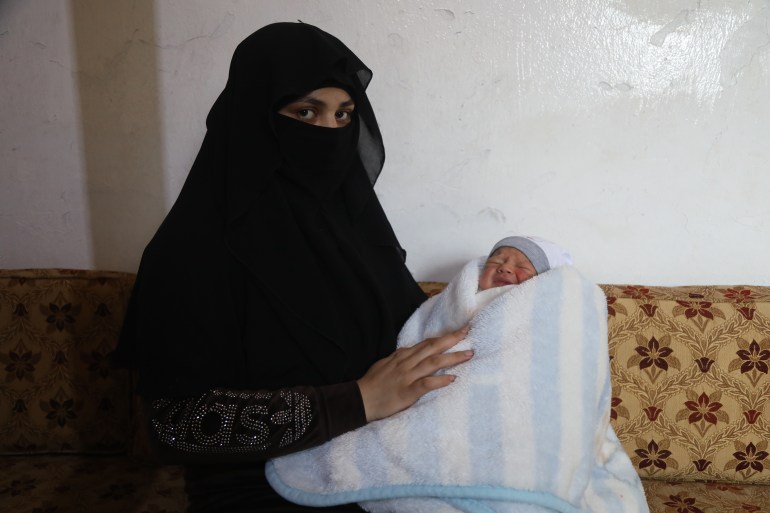
Absence of heavy equipment
Al-Mousa is one of many who lost entire families to the 7.8 and 7.6 magnitude quakes that struck Turkey and Syria.
More than 46,000 people have been killed, with the death toll expected to climb as many people are still missing.
Neither Turkey nor Syria have said how many people are still unaccounted for. The Syrian government and United Nations said more than 5,800 people died in this country alone.
In the rebel-held northwest, the devastation wrought by the quakes was compounded by the delay in humanitarian aid and the absence of international efforts in search-and-rescue operations.
Instead, the Syria Civil Defence, also known as the White Helmets, was at the forefront of digging through rubble with limited resources, and on February 10 – four days after the quakes took place – announced in a press conference the end of their rescue efforts.
“The absence of heavy equipment capable of dealing with natural disasters affected the ability of the teams to respond in a timely manner,” said Munir al-Mustafa, the deputy director of the White Helmets. “We don’t have advanced thermal equipment capable of detecting those trapped under the rubble, as well as trained police dogs.”
Al-Mustafa also pointed to the aftershocks, cold winter weather, and heavy rain in the first two days following the quakes, which impeded rescue operations and led to further concrete collapses.
“Currently, we are continuing our work in removing rubble from roads and vital areas, and our teams are ready to follow up on any report of missing persons,” he said.
The White Helmets lost four members along with their families. According to al-Mustafa, 2,274 people died in the northwest region, with more than 12,400 others wounded.
“Our teams documented the collapse of more than 550 buildings, while more than 1,570 buildings were partially damaged and thousands of buildings and homes were cracked throughout the earthquake-hit areas,” he said.
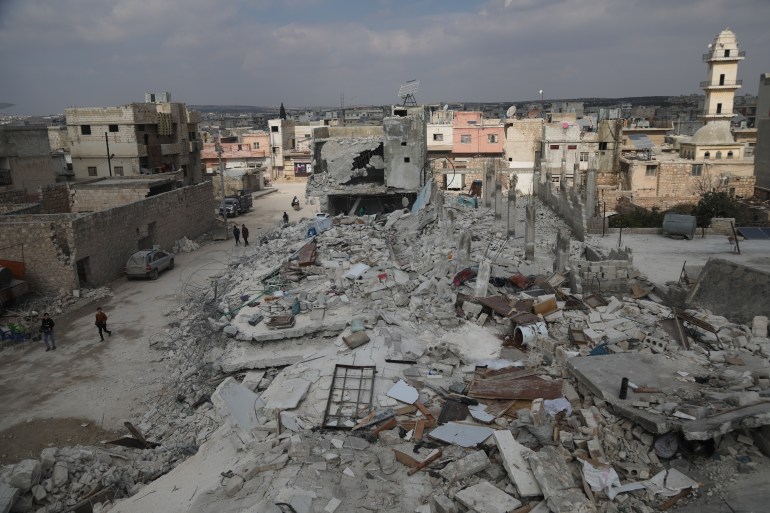
‘Like losing a part of your body’
The quakes have only compounded the psychological trauma of residents of the territory – which is home to more than four million Syrians, half of whom are internally displaced by Syria’s 12-year war and have fled government-controlled areas.
Healthcare experts have warned that earthquake survivors might develop longer-term mental health problems, such as depression or post-traumatic stress disorder (PTSD), and that mental health in the region is expected to further deteriorate in the wake of the disaster.
Two of Tariq al-Sayel’s six children died after his apartment building fell in the town of Absinya. He also lost 70 relatives on both sides of his family.
“It’s like losing a part of your body,” the 37-year-old said.
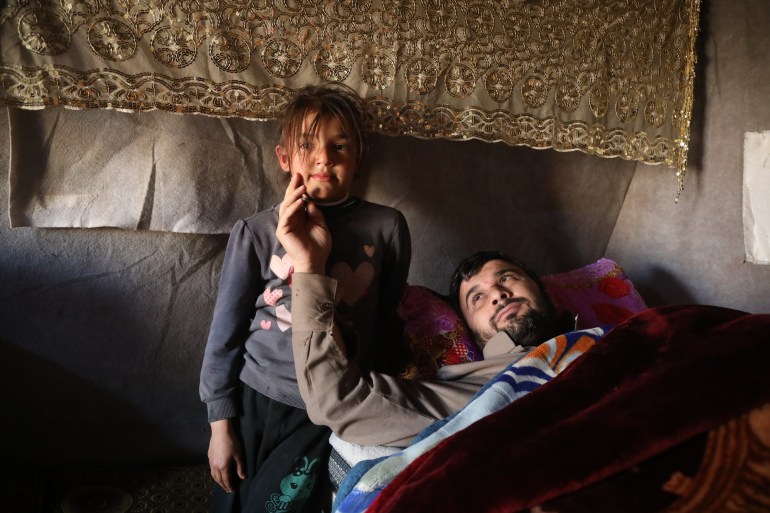
Back in Atarib, Mahmoud Omar al-Ormi recounted how he lost almost his entire family, with the deaths including his pregnant wife and four of his six children, who ranged from 18 months to 15 years old.
“I told my wife Adeela – may God rest her soul – I wanted to go out and see what was happening,” he said, describing the first moments of the quake. No sooner had he and his son Ahmad, 7, reached the front door, than their home collapsed, burying half of his body.
Ahmad was the first to be rescued and Mahmoud was pulled out half an hour later.
“I was bleeding from my head and my legs. I thought I was dying,” he said. “When the rescuers pulled me out, I felt like I was reborn.”
The feeling did not last long as he waited for hours for any sign of life from his wife and five other children.
After eight hours, just after noon on the same day, his two-year-old daughter Shareefa was pulled out, her face heavily bruised and her eyes swollen shut, but alive.
He waited until the next night before rescuers pulled out the lifeless bodies of his wife, his other two sons, Omar, 15, and Sha’ban, 14, and his daughters who were 13 years and 18 months old.
“I spend my days walking in our neighbourhood, looking at the sheer scale of destruction,” al-Ormi said.
“I visit their graves every night and shout at my family to respond to me and cry when they don’t. This is God’s will and we have to accept it,” he said, his voice breaking.
Additional reporting by Linah Alsaafin
